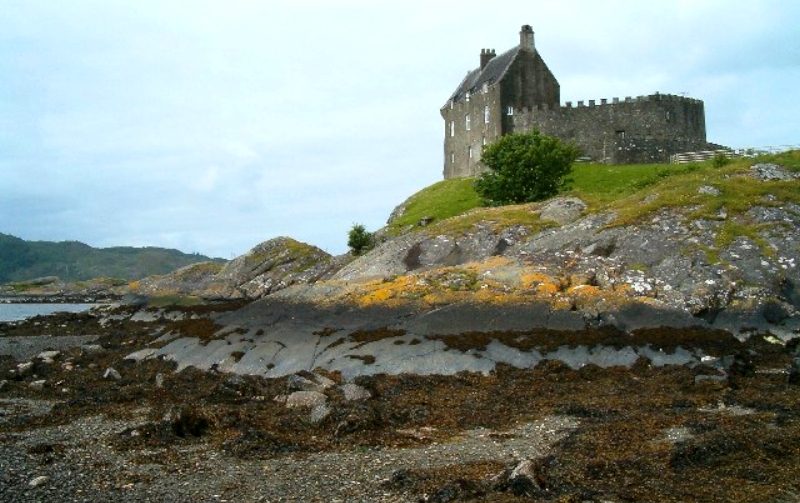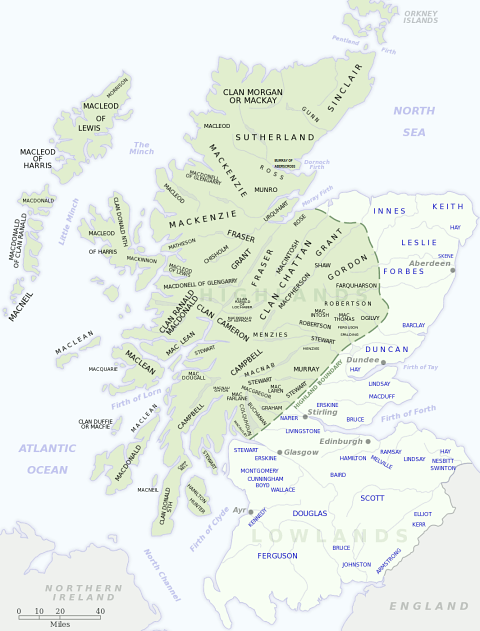
Motto: In ardua tendit (He aims at difficult things)
Historic Seat: Duntrune Castle
District: Argyll, Stirlingshire
Associated Surnames: Malcolmson
Associated Tartans:
Early Malcolm Genealogy and History:
(Excerpt from "The Scottish Clans and Their Tartans", James Grant, 1906)
According to tradition this clan settled at a very early period in Argyllshire; yet in Robertson's Index we find a charter from David II (1330-70) "to Nicoll Malcolme of ane tenement in Stirling;" and from Robert II (1370-90) two charters, one to Murthac, son of Malcolm, of the half lands of Leckie, lying near Buchanan, in Stirlingshire, resigned by Malcolm his father; and another to the said Murthac, son of Malcolm, of two-fourth parts of the land called Racheon and Akrenmoneyth, in the Lennox, with the office of serjeandry1 in the shire of Dumbarton, on the resignation of Malcolm, his father.
Sir Archibald and Sir Colin Campbell (father and son) were according to the Douglas Peerage, Lords of Lochow between 1340 and about 1442; yet in Burke's "Landed Gentry" it is stated that in 1414 Sir D. Campbell of Lochow granted to Reginald Malcolm of Carbarron certain lands in Craignish on the shore of Loch Avich (a fresh-water lake in Nether Lorne), with the hereditary Captaincy of his Castles of Lochaffy and Craignish.
He died in 1446, and was succeeded by his son John, who was confirmed in these in 1448.
"This family," continues the same writer, who is usually most acute and correct," which seems soon after to have declined, appears to have been a branch of that of Poltalloch, from the circumstance that the farm of Carbarron, then the only remaining portion of their possessions, is said to have been bequeathed by the last of this race to Zachary (Malcolm), the then proprietor of Poltalloch, as representative of the elder branch of his house."
Donald, son of Archibald, son of Malcolm, was seized in the lands of Poltalloch on the 18th of May 1562, and was the lineal ancestor of Neil Malcolm of Poltalloch, who succeeded his cousin Dugald of Poltalloch in 1787. He died in 1802, and was succeeded by his son, Neil Maclolm of Poltalloch.
In the Parliament of 1650 John Malcolm of Balbedie, head of another branch of the clan, was one of the seven gentlemen who were ordained to provide meal for the Scottish army against Cromwell, who was then at Linlithgow, and in 1665 he was created a Baronet of Nova Scotia, or Scotland, by Charles II.
In the Parliament of 1678 he was a commissioner for the shire of Fife, in levying £8,100,000 (Scots) for the use of the King. Others of the name appear in the Parliamentary Records at that time; viz., Sir John Malcolm of Invertick; Sir John Malcolm of Inverteh; and two others, the Lairds of Lochar and Nethhill.
The Baronets of Balbedie were afterwards of Lochlow.
Sir John Malcolm succeeded to the Baronetcy in 1795 on the death of his distant relation, Sir Michael Malcolm. His son, Sir Michael, married in 1824 Miss Forbes of Bridgend, and had three sons, the eldest of whom became Sir John Malcolm of Balbedie and Lochow.
Three members at least of this clan have attained to distinction in recent times.
The first of these, John Malcolm, a pleasing and accomplished poet, was a son of the minister of Firth and Stenness in Orkney, where he was born about 1795. Failing to obtain a commission in the army, he joined our troops in Spain as a gentleman volunteer, under General Graham (of Lynedoch) then besieging San Sebastian, and for his gallantry received an Ensigncy in the Black Watch, with which he served throughout the war. A ball in the right shoulder at Toulouse, and the debility, consequent thereto, caused him to retire on half-pay, and he first became known to the public by some exquisite verses he produced on the death of Byron and other pieces in "Constable's Magazine." His "Reminiscences of the Campaign of 1814" and so ably written that many extracts from it were inserted in the War Office Records of the 42nd Highlanders. In 1828 he published "Scenes of the War" and "Tales of Field and Flood." He succeeded his friend, Lieutenant Sutherland, author of "The Knights of Malta," etc., as Editor of the Edinburgh Observer, and died there in 1835 in his fortieth year.
General Sir John Malcolm, a distinguished soldier and diplomatist, was born at Burnfoot, Dumfriesshire, his father's farmhouse. One of seventeen children, he joined the East India Company's Service as a Cadet; served as a captain at Seringapatam; and when Colonel, was our Ambassador in Persia. After a long and splendid career, he died in 1833, but won a monument in Westminster, and also an obelisk one hundred feet high in his native village.
Admiral Sir Pulteney Malcolm, elder brother of the preceding, distinguished himself in many brilliant engagements and in many posts of importance; latterly as Commander-in-Chief of the St. Helena Station, where he won the regard of Napoleon, and died a K.C.B.2 in 1838.
The progress in life of the sons of the humble farmer, Robert Malcolm of Burnfoot, was remarkable. Robert, the eldest, was high in the Civil Service of H.E.I. Company; while James, Pulteney, and John, were all Knights Commanders of the Bath for distinguished Services. The younger sons were Gilbert, rector of Tottenham; David, head of a commercial house in India; and Captain Sir Charles Malcolm, R.N.1 John Malcolm of Poltalloch was created Lord Malcolm in 1896.
(End excerpt)
Next page: Clan Matheson
Footnotes:
1 office of serjeandry: officer who enforces the judgments of a court or the commands of one in authority
2 K.C.B.: Knight Commander, The Most Honourable Order of the Bath. Read about the Order of the Bath at Wikipedia.
3 R.N.: Royal Navy

Distribution of Scottish clans and families
View larger map at Wikimedia Commons

Browse the Clan Malcolm Tartan Collection with home decor, personal accessories, crafting, paper products, and more.

Browse the Clan Malcolm Dress Tartan Collection with clothing, home decor, accessories, electronics cases, and more.